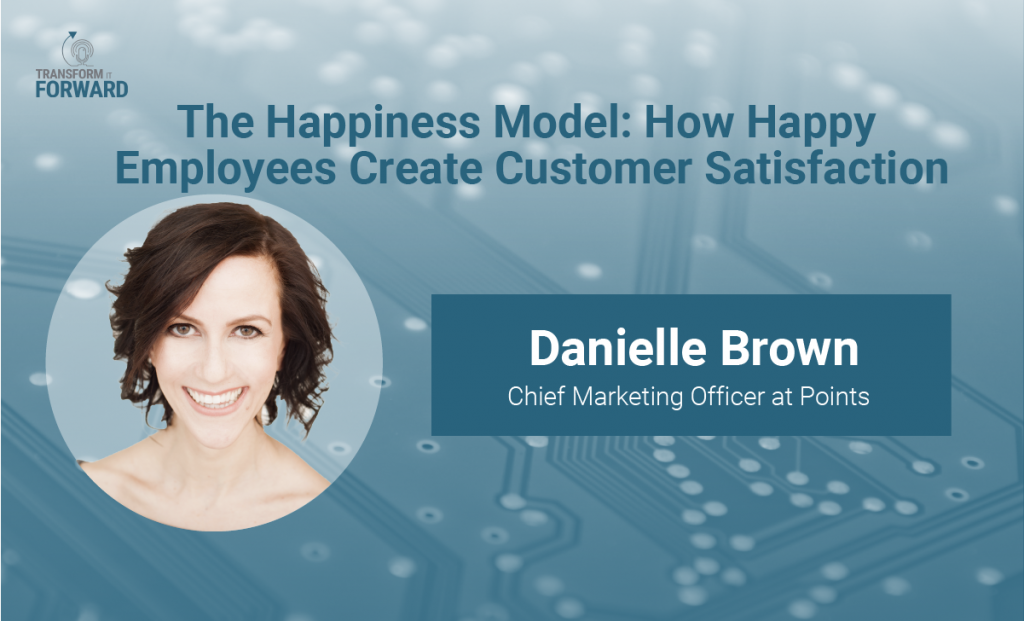2020 has changed how customers interact with their favorite brands. Companies have had to get creative in the way they communicate with their customers, how they reach them, and potentially even adopting new distribution channels. Behind all of this creativity, there must be an organizational model for happiness.
On this episode of the Transform It Forward podcast, our host, Paul French, sat down (virtually) with Danielle Brown, the Chief Marketing Officer of Points.
Points is a technology organization dedicated to helping brands enhance and monetize their loyalty currency. Today, they serve 60 of the world’s largest hotel and airline brands.
Danielle’s team faces the unique challenge of having two layers of customer satisfaction. While helping their partners build technology and power new ways for loyalty members to get and use their favorite loyalty currency, Points must also create strategies for marketing to those loyalty members.
“We have this unique responsibility where it’s not in all cases directly B2C, but it’s almost B2B2C. We have to represent our partners’ brands and their customer experience in a way that they would be proud of.”
With most of their partners in the travel space, the COVID-19 pandemic created a marketing challenge for Points. They had to build opportunities for customers who had lost their primary source of revenue while providing their loyalty members with new ways to spend loyalty currency. The result? A diversification strategy to transform products into new types of digital currency.
“We always saw ourselves as a digital currency. That wasn’t what took a different mindset. What took a different mindset was the speed of change, not the fact of change.”
The Trust Model
The catalyst for Points’ ability to diversify quickly was an internal trust model. After realizing a lack of trust within one of her teams, Danielle wanted to develop a structure that would change the culture. The team came together and decided that a trust model required four key elements:
- Creating transparency
- Practicing accountability
- Delivering results
- Practicing straight talk
If all four things happened, the team could trust each other and take more risks while feeling supported.
Even after Danielle left the company, she later returned and found that the model had grown and developed into the company culture. This helped enable their rapid pace of change while exposing cross-functional work happening across the entire organization.
When COVID-19 hit, Points was forced to put a hiring freeze on its product development team. The trust model created a base from which Danielle could shuffle resources internally.
Customer support team members suddenly showed an interest in web development. Marketing managers started assisting with delivery project management. Danielle calls it the most fascinating change in development she had seen in her career.
“We got this crash course in what happens when you realize that everybody is in it together and you don’t have to treat people so preciously. I’m not saying you don’t have to care about people or respect people, but I think showing people that you trust them to move quickly is much greater respect than handling them with kid gloves.”
The Happiness Model
With the shift to remote working, Danielle knew her team needed more than just a trust model to continue building creative diversification strategies for their partners. The team came together again to decide on the six core criteria for a happiness model, in which all employees must:
- Feel that there is an acknowledgment of their work.
- Be able to create a balance in the way they are working.
- Feel they are getting challenged daily.
- Have clarity on what teams are supposed to do.
- Feel connected to their team members.
Trust is great. But when you’re going to build a high-performing team and a team that can react to something as volatile as COVID-19, they need to be happy. Customer experience will never be positive if it’s not run by a happy team.
For Danielle, it’s more important than ever to take the time to invest in your team, focus on their emotional health, and measure their happiness as a core KPI.
“Happiness and trust feel a little squishy. But we’re people and we’re squishy. We really do need to look at the emotional health of our team in order to deliver fantastic customer experiences all the way through the organization.”
The trust and happiness models work within Points’ guiding principle: to be a trusted partner. By understanding what partners need to accomplish and building an internal culture that can help them get there, Danielle’s team has become more productive, inventive, and — at the end of the day — happy.
To listen to the full podcast, click here.
[claudication color=”red” button_text=”Click Here” button_url=””]
If you missed the last two podcasts, discover them here:
Five lessons for digital transformation with Anna Foat.
4 tips for Digital Transformation during COVID with Victor Lee.
[/call_to_action]
